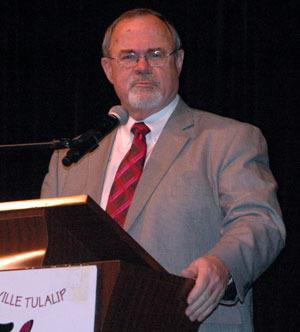TULALIP — Gary Chandler, vice president of government affairs for the Association of Washington Business, sounded a note of mixed optimism as he delivered a legislative update to the Greater Marysville Tulalip Chamber of Commerce on Feb. 22, complimenting what he deemed a “bipartisan” state Senate, while still dismissing many of its processes as futile.
“We’re probably going to get a lot of good things from the Senate that die in the House, and a lot of bad things from the House that die in the Senate,” Chandler said. “Washington is not a competitive state. Between state and local taxes and unemployment insurance, our businesses are paying 58 percent of those taxes, a higher percentage than California, Idaho, Oregon or Texas. The question we need to answer is, why would businesses want to come to Washington?”
Chandler praised Marysville Mayor Jon Nehring and Greater Marysville Tulalip Chamber President and CEO Caldie Rogers for their roles in promoting the state House Bill 1443, sponsored by Republican state Rep. Mike Hope and Democratic state Rep. Mike Sells, which would provide property tax exemptions for the value of new construction of industrial and manufacturing facilities in targeted urban areas.
“We need to nurture the businesses we have while welcoming new business,” said Chandler, who believes the state legislature’s top three priorities should be creating jobs, developing “a world-class educational system” and crafting a sustainable budget with no new revenue. “This bipartisan coalition is very fiscally and education-minded, and they’ll have the power to appoint chairs for a number of committees which direct legislation. Those chairs will be open to listening to a number of ideas, which has not normally been done.”
Chandler believes that getting more citizens employed will encourage them to spend more money, which in turn will benefit the market, and to that end, he hopes to see Washington’s education system begin to train its students to be employable after graduation “for the jobs of today.”
Chandler expressed his frustration at seeing another bill proposing a state income tax, since “the public has spoken with a very clear ‘no’ on this issue,” and he criticized what he sees as the deceptiveness of certain tax packages, both those already made into law and those currently under consideration, for “supposedly going away, except for the parts that don’t.”
“The state B&O tax was originally introduced as a temporary tax,” Chandler said.
Chandler noted that the state legislature is currently considering “more bills than I’ve ever seen” on education, raising questions about whether schools should be graded on an A-through-F scale, whether the state should take over “failing” schools, and whether such schools should be run as nonprofit or charter schools.
“The [state Supreme Court’s] McCleary versus Washington decision was not all about raising taxes, as Sen. [Bruce] Dammeier pointed out,” Chandler said. “It was also about making fundamental reforms to how the system serves our students, so that we’re not just pouring more money into an outmoded system.”
Chandler added that the Association of Washington Business is running legislation to preempt the conditions of “Seattle sick leave,” under which employees who spend more than 240 hours a year in Seattle as part of their jobs are entitled to benefits such as sick leave for doing so, even if their employers are not based in Seattle.
“Our bill proposed that only Seattle-based businesses should have to comply with that condition,” Chandler said. “Especially for truckers coming from eastern Washington, those hours can add up.”
One area in which Chandler was not opposed to new revenue was generating funds for transportation infrastructure, for which he supported a 10-cent gas tax increase, spaced out to increase 2 cents every year over the course of five years, as well as fees of $100 per electric car and taxes on bicycles costing more than $500.
“Nobody likes new taxes, but if we don’t invest in our roads, they will crumble,” Chandler said. “We’ll also be seeing more toll roads than we could ever want to have. As our vehicles are getting more and more efficient, the revenues from gas taxes are going away. They’ve dropped every year.”



